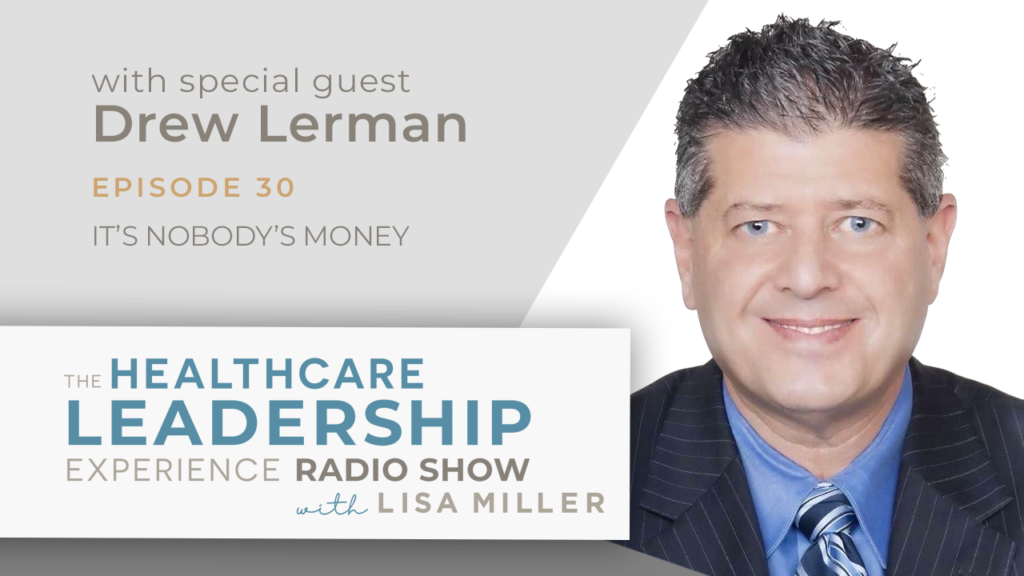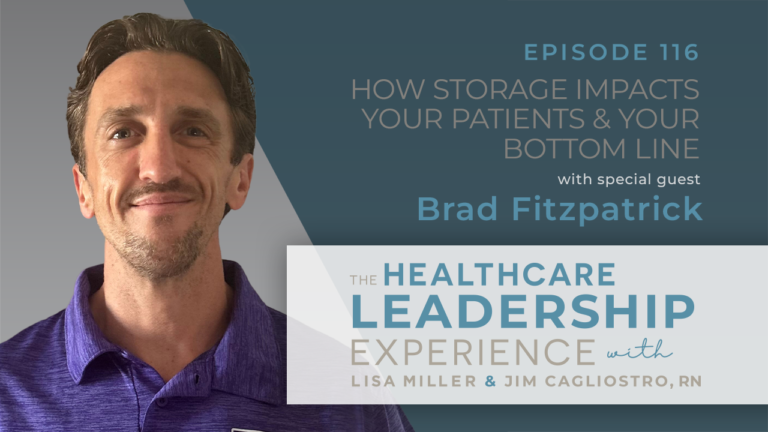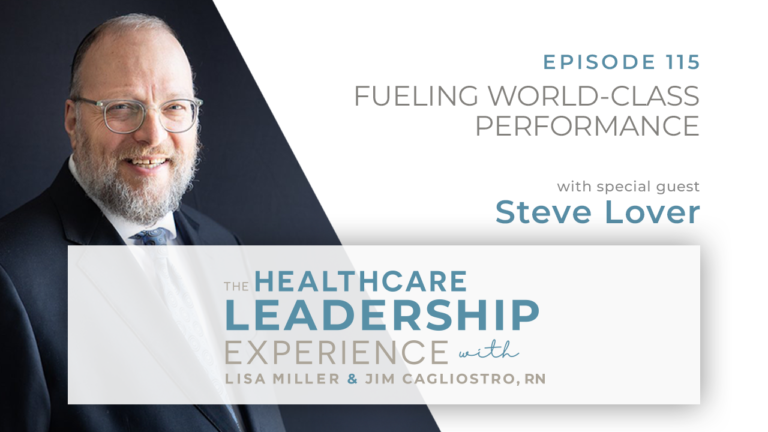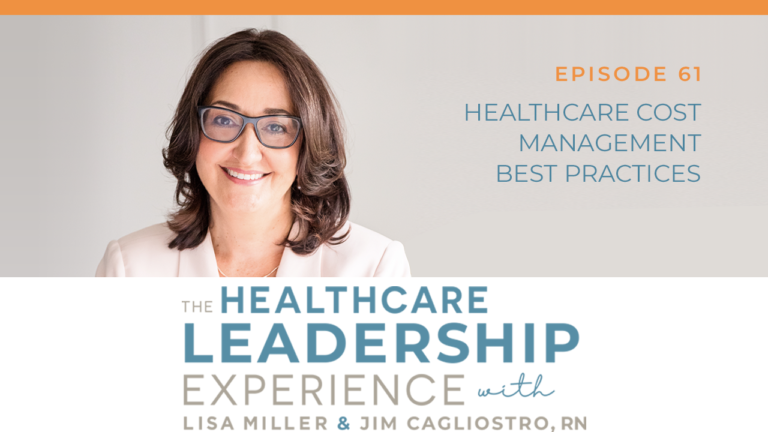Finance leaders need to get out of their comfort zone and build relationships.
In Episode 30 of The Healthcare Leadership Experience, Lisa is joined by Drew Lerman, Director of Finance at Southwestern Vermont Healthcare, to discuss challenges in healthcare finance and his upcoming book “It’s Nobody’s Money.’’
Drew comments: ‘’…the challenges I see are accounts receivable, hiring, getting people through the door and planning on living on Medicare. …you have to be a profitable organization assuming that you’re only going to be paid the Medicare rates.’’
This episode is sponsored by VIE Healthcare Consulting® which has proudly helped hospitals save $772 million since 1999.
In today’s episode you’ll hear:
- Strategies for working with vendors and the importance of dialogue when you’re facing cashflow challenges. ‘’ I found it was helpful to at least keep the dialogue going. That kept the supplies coming into the hospital.’’
- The challenges facing CFOs in 2022, the four combination approach, and why every hospital needs to have a Plan B and a Plan C.
- The big opportunity for finance leaders: to get out of their comfort zone and build relationships. ‘’You don’t want to be called the ‘’C F No’’, you want to be able to engage people, otherwise you can fail.’’
- The real reasons people get into healthcare. Hint; It’s not all about finance.
- Insights into Drew’s upcoming book, ‘’It’s Nobody’s Money’’, ‘’The bottom line is, you have to treat the money like it’s your own … that means every director, every department. … you have to get ‘’replacement’’ out of your vocabulary.’’
- How your health system can benefit from a performance engineer – and how benchmarking against your own hospital can impact your bottom line.
- The need to think differently, and Drew’s ultimate goal for healthcare finance, ‘’I want to make finance a non-threatening term in a healthcare organization. You don’t have to run when finance people call. We’re there to help you do your job. We’re there to give you the tools.’’
Watch the video referred to in this episode here: Empathy, The Human Connection to Patient Care
Connect with Drew
Email Drew at drew.lerman@svhealthcare.org
Connect with Lisa:
📧 lmiller@spendmend.com
📱https://www.linkedin.com/in/lisamiller/
Episode Transcript
CLICK HERE TO DOWNLOAD THE PDF TRANSCRIPT
CLICK HERE TO OPEN THE FULL TRANSCRIPT
Introduction (00:02):
Welcome to the Healthcare Leadership Experience radio show, with your host, Lisa Miller. Lisa is an entrepreneur, inventor, advisor and founder of Vie Healthcare Consulting, the leading healthcare advisory and analytics firm, helping hospitals accelerate their margin improvement goals, Lisa loves to think differently and collaborates with leaders and their teams to solve challenges and to create new, innovative approaches that impact the clinical and business side of healthcare. Our show will bring you leaders and innovators within healthcare and across multiple industries. Be a part of the discussion that will give you a unique perspective, deep insights and roadmaps to successfully help you navigate the clinical, financial and operations of healthcare. Your show starts now.
Lisa Miller (00:49):
Hello, this is Lisa Miller and you’re listening to the Healthcare Leadership Experience on Healthcare Radio Now and I am really excited today as we have Drew [Lerman 00:01:01] who works at Southwestern Vermont Healthcare as director of finance with a long standing career in healthcare finance, over 40 years and I have lots of questions for Drew and also he has an upcoming book called “It’s Nobody’s Money.” If you missed last week’s episode, it was about trends in healthcare, I encourage you to listen, that’s episode 29, and today this is episode 30. Again, we have Drew Lerman with us, Drew, welcome to the healthcare leadership experience.
Drew Lerman (01:34):
Well thank you and thank you for having me on.
Lisa Miller (01:36):
You’re welcome. So I would like you to just give us a background of you, your career, hospital finance and just, you know, a little bit of your history because you have a really extensive, deep expertise in finance and decision support to working with small, large health systems as VP of finance and it’s, it’s a really interesting expertise and you’ve seen a lot of changes in healthcare, so I, I just would love to hear a little bit about your background and your career and just to give the audience an overview of you.
Drew Lerman (02:12):
Sure. I’ve been in financial operations for over 40 years. I’ve been with seven different facilities. I’ve been with small facilities, I’ve been with large facilities, I’ve been with religious facilities ranging from 75 million to 500 million to a billion organizations. I’ve gotten the pleasure of working in almost every capacity that I’ve overseen, such as I started in accounts payable, I’ve been in reimbursement, I’ve been in payroll, I’ve been in, uh, the general county functions, I’ve done the financials from start to finish, when I started my career, I got to be a manager at a very early age. I was the number one in finance at the age of 26 at one facility although it, it was small. .
So, um, I’ve gotten to see a lot in finance, I’ve gotten to know a lot of people in finance and really been in depth into the financial operations of all the facilities I’ve worked for.
Lisa Miller (03:11):
So, that’s why I was so excited to speak with you as well as talking about your upcoming book because you have an AP experience, which I think, you know, gives you probably a unique perspective as a leader, healthcare leader in finance and working in decision support and all the aspects. I think because healthcare has so many different components of finance, but when you have someone that’s had the job of doing those various functions, I think it, it really ties it all together and you can see the connections, right? And you can see the opportunity. So I don’t know what you feel about that, but I certainly see that having more connections allows you to see the patterns, put the pa- together the puzzle, you know, of healthcare together to see the, the relationship of cost to reimbursement and you know, invoicing to contract, so I don’t know if you wanna share a little bit about that?
Drew Lerman (04:07):
Sure, the, there’s a lot of opportunities there. When you deal with various vendors, first of all you have to be able to time out your payments to them, but when your cash is short, you have to work with them. And I know that in the, at least in the accounts payable world, dialogue with the vendor is important because if you don’t let the vendor know what’s going on, it actually makes the situation a lot worse and then you start to have supply chain problems, of getting supplies through the hospital and you never wanna be in that position, and I have had the opportunity to work with facilities that had cash flow challenges and tried to work with the vendors and I found it was very helpful to at least the communication going and the dialogue going. That kept the supplies, you know, keep coming into the hospital.
Lisa Miller (04:55):
You bring up a really good point because there’s so many aspects that impact supply chain and as you said, said it so well, really that open communication is, is really critical with the vendors to be able to work with them and, and keep the supplies coming and that’s a really good perspective and I think, uh, you know, one that will probably be, unfortunately maybe, dealing with more as next year embarks on us with inflation and some challenges hospitals have, but that’s a really good point about communication and vendors are probably really willing to work with hospitals that have that flexibility.
Can you share your perspective on the biggest challenges hospital finance leaders face and will face in 2022?
Drew Lerman (05:40):
In addition to COVID, I mean the challenge is about just even getting people hired in various areas throughout the hospital. I think that everybody has to have a plan B and a plan C, because things can go south in facilities very easily. The reimbursements are, are challenge because they, the insurance companies are throwing every obstacle in place other than pay you and the accounts receivable becomes, you know, very critical under COVID and I think that working with the physicians is, is also very important because I truly believe un- until you align the payment mechanism between the physicians and the hospitals, you’re going to have a constant challenge with them and what I’ve tried to do with the physicians is show them what things actually cost, especially in the operating room area. So I think that the challenges I see are just the accounts receivable, hiring, getting people through the door and planning on living on Medicare because most of the insurance companies are trying to pay closer to what Medicare is paying and I think that you have to be a profitable organization assuming that you’re only gonna be paid the Medicare rates.
Lisa Miller (06:54):
Yeah, I agree with you and I love the combination that for, that four combination approach and one of the things that we’ve been working on more and talking about more is the working with physicians, particularly in the OR and you know, how do you have those communications well before, you know, there’s a renegotiation or a utilization review, how do you engage those physicians to really help them understand what the costs are and I think, I think that’s what you’re talking about is it’s a new level of, you know, bringing those physicians in and aligning physicians well before those, you know, contract negotiations begin.
Drew Lerman (07:34):
Well I can give you an example, uh, in orthopedics where I work with the, um, orthopedic department and tried to show them because they’re very, very expensive supplies that they use in their procedures and I sat down to breakfast with the head of the orthopedic department, not here but in a previous facility and he looked at me and he said, what, you know, what’s in it for me? And it was… and I had to sit back and think about that for a second, but what I told him is that you will share in the cost savings. We will be able to put money aside for your department. So if you need to expand or you need a piece of equipment, you’ll have it. And that seemed to work. They actually jumped on board with that and I was able to standardize a lot of the supplies that they were using.
Lisa Miller (08:21):
So, there’s a way to work with physicians not on a gain sharing basis where they’re getting money versus a, a way that they can put money aside for their department and have a departmental incentive I think is a strategy that’s brilliant and most hospitals should be looking to do that because sometimes, they’re wanting, whether it’s, you know, uh, new lights or even… they, they want their own special gloves that maybe it’s only 50 cents more per glove, obviously that adds up, but they’ve got some kind of incentive or some dollars in their own bank because they’ve contributed to a cost saving initiative and I, I think that’s, uh, a brilliant strategy. We’re seeing it work, obviously it worked for you. (laughs) So, you know, it’s… you know, sometimes you don’t need big, large, complicated strategies, you know? Just things that are give and take, you know? They’ve made an investment and then you know, they’ve got some money, you know, to share in that investment for their department, and ultimately, you know, for the good and the hospital and for patient care, so I think it’s a win win all the way around.
Drew Lerman (09:29):
Yeah, and I think, I think eventually you’re gonna have to include physicians in the, um, as accountable care organizations start to become bigger and bigger, part of your re- revenue stream, you’re gonna have to consider some type of model to deal with the physicians in order for them to have teeth in the game.
Lisa Miller (09:48):
I agree, I absolutely agree, and, uh, the, they’re the biggest driver of cost or influences and you know, I, I think it’s going to take a, you know, a, a real thorough strategy and alignment, like you said earlier and I love plan B and plan C because I think you’re gonna need a plan C, too, in what you talked about with ma- managing to Medicare, I think that’s so smart. You know-
Drew Lerman (10:14):
Well I, I… somebody… one of the heads of the hospital association once put a quote that said that a, a budget is a plan, not a promise and I think that you have to be flexible in how you go about it during the, your fiscal year.
Lisa Miller (10:29):
Yeah, I like that. So what do you see as the biggest opportunities hospital finance leaders face? So you know, we talk a lot about challenges and I think unfortunately we have head wins of big challenges coming our way, but there has to be opportunities and I’m wondering what you see as the biggest opportunities for finance leaders.
Drew Lerman (10:49):
I think finance leaders have to get out of their comfort zone. I’ve seen a lot of brilliant finance people fail when healthcare because they don’t have communication skills. They can’t engage employees across the, uh, entire hospital. I’ve had the good fortunate that I have good relationships with the clinical people and I’m considered fair. I mean, you don’t wanna be the, uh, called the CF No, you don’t wanna be called, you know, you don’t wanna be turning people away all the time. Um, you have to be able to engage people and I’ve seen people that I’ve reported to throughout my career and other financial leaders in other organizations fail because they can’t communicate. They, you know, they can’t engage people and they can’t motivate them into one common cause and I think you have to have that ability in order to survive as a financial leader. You have to be able to work across the spectrum with doctors, you have to be able to work with the, um, the clinical staff, you have to be engaged.
Um, I, I have the, you know, the good fortunate here, at Southwestern Vermont, my chief financial officer, I’ve known since the early 90s. You know he can go at 50,000 feet and jump right under the hood and do a bank reconciliation and he’s engaged with people, so you know, it’s been a, I’ve been very fortunate to be able to work for people like that versus people that can’t communicate and they end up, you know, um, hurting the organization because they can’t get their message out, they can’t get them engaged and they can’t get them towards a, a common goal.
Lisa Miller (12:22):
So once again, I love what you just said and it’s a theme that’s been coming up more and more for me and for other engagements that we’ve been working on and its, it’s so interesting, CF No, I’ve never heard that before, but it’s true. I think that, um, this whole aspect of, uh, finance leaders understanding the change management or that process of engagement and communication is so critical. I’m learning that as well because sometimes you feel like okay, this is the opportunity to save money and, and you should know, you know, that it’s the right thing to do and lets go do it and you know, for some people, you know, that, that does click but however, I think, and again I’m speaking from my perspective and, and others I’ve had conversations with in finance goals, you know, we, we’ve gotta learn to be better about how we communicate, how we align, how we motivate, um, and that’s probably, you know, soft skill but it’s probably an absolute necessity in order to, to you know, move some of these engagements along and I, I’ve been learning that as well, Drew, I think it’s really a great point about that’s the opportunity for finance leaders. How do you move and align and really motivate and it really is bringing in this change management skill set into the finance equation.
Drew Lerman (13:43):
You know, its interesting to me. Um, I was asked one time to talk before a cardiology group about profit and loss statements by physician which I developed when I was at a hospital in New Jersey and at the end of that, being a financial person, I actually showed them a film from the Cleveland Clinic called Empathy and I did that because I want them to understand that you get into healthcare for a reason. It’s not all about finance. It’s about taking care of people and the short clip on empathy kind of sums up how I feel about everything.
Lisa Miller (14:23):
That is an amazing clip. You just reminded me of that and I watched that years ago. I, I’m going to watch it again. Thank you for sharing that and for those listening, uh, the empathy clip which I may add to the show notes is such a well done clip about the perspective of why we do what we do and it really puts… you get to see healthcare in, in the individual, you know, feelings and eyes, so Drew thank you for bringing that up.
If you’re just tuning in, you’re listening to the healthcare leadership experience radio show. I’m Lisa Miller your host and today I’m joined with Drew Lerman who’s a finance executive at Southwestern Vermont Healthcare and we are now going to be talking about his new book, Nobody’s Money. This show is sponsored by Vie Healthcare Consulting, the leading healthcare advisory and analytics firm, helping hospitals accelerate their margin improvement goals. Vie has collaborated with healthcare leaders and their teams to accelerated their strategic initiatives and improve their financial performance by over one billion dollars since 1999.
So, I’m gonna jump, because I think I wanna spend more time then, and some other questions I had for you about your new book. So you wrote nobody’s money. Can you please share with us why you wrote the book and who this book is for before we get into some of the details, just like to hear the backstory about this.
Drew Lerman (15:49):
Well, there’s certain, um, chronologic, you know, my, uh, my career, but, um, what I’m trying to get the point across is that people in healthcare, in the nonprofit 501c3 world don’t treat money the same as if it was their own and they make decisions that are mindbogglingly that you just don’t see in a normal industry and I’ll give you an example of… in my career, I’ve seen people put up new buildings with no business plans that did no, no additional volume, things that would never get approved and a lot of the things and a lot of the initiatives that take place in healthcare never have look backs. They never go back and see what happened. You know, was it what they anticipated? Is it what they thought it was gonna be? Did it make the money that they thought it was gonna be?
And this happens time and time again and throughout my career I started to keep almost like a diary of these type of things because they were so frustrating to me is that, uh, you couldn’t get people to get the idea of spending the money like it was their own. A lot of the waste in the healthcare that I’ve seen, a lot of the consultants that come and and absolutely tell you what you already know is the problem and just because they bring in a, a nice PowerPoint report doesn’t mean that anybody has the appetite to, to pull the trigger and do any of those things anyway. So a lot of this stuff is a lot of dollars are spent with no results, no returns, there’s a lot of dollars that are spent that nobody goes back and, and takes a look at. There’s the board of, of directors of most hospitals or the board of governors or whatever they call their board, always has the same people on it, you have, uh, you have the insurance person, you have the bank person, you… and it always seems to be the same, all the voluntary boards that I’ve seen in my career, they don’t get any teeth in the game, except for their own particular business that they happen to be in.
So they may be community members but they, they don’t… it’s not always in the best interest in the facility that a lot of these things are done or buildings are done or, or you erect something that has basically no return. Aesthetically it might be pleasing, but it’s not bringing any new business in. So, and you’re also constantly, you know, I see that consultants, they, they work, they work a different way, um, they all have different agenda when they come into the facility, I mean you can have a turnaround company and their agenda may be to replace all of the upper management. I’ve seen that before. So I’ve, I’ve been in a, a number of facilities where you may be making money and you bring in these companies because you think your operating margin isn’t even enough and a all these companies have their own agenda about who they, you know, where they wanna replace and how long they wanna be there. So I wrote the book because the bottom line is is that you have to treat the money like it’s your own in a facility and that means ever director, every department. And you have to look at things. You can’t… you have to look at labor, you have to get replacement out of your vocabulary. You have to be able to, to do things differently.
Right now during 2022, I brought in a performance, uh, engineer because I wanna help departments do things more efficiently. I wanna be able for them to working at work per unit of service, what they call WHPUS, work hour per unit of service and I want them to improve on that. I don’t wanna have to bench mark them against other facilities because it doesn’t serve any purpose. But if you benchmark against yourself and make incremental improvements, then it’s gonna drop right through your bottom line. So, I, I guess you know, the book is really ma- uh, a chronical of, of my frustrations in healthcare throughout the years and where I see it going. And again, I think I’ve eluded to that, until you aligned the way physicians get paid and hospitals get paid or you make the physicians have some teeth in the game, you’re not gonna be successful in the, in the payment models that are coming up.
Lisa Miller (20:04):
So, Drew, thank you so much for giving us that background. I love, uh, what you just talked about, particularly about bringing in a performance engineer and bench marking against yourself and making incremental improvements. I think this industry has gone way over the top with like benchmarking against others and I’ve often felt like okay, well your bench marking either in a silo of a GPO or a silo of whatever hospitals they have and the benchmarking, you know, you don’t know how those numbers are being put together and listen, we bench mark, but I understand and I often talked about sometimes the benchmark and the real break throughs are when you really kind of look within your organization and build a case based on whether it’s reimbursement or like you’re talking about, even benchmarking against yourself, setting a baseline and then making incremental improvements. I think that’s how you really optimize and go well beyond benchmarks.
Can I ask you what made you bring in a performance engineer and just give the listeners a little more detail on that? ‘Cause I feel like that’s a great strategy, people are probably like oh, I think I, I wanna learn more about that.
Drew Lerman (21:17):
Well, we had a benchmarking company that we utilized and I used to put out the reports every quarter and show them where they were in relation to other hospitals our size, same volumes, every department had a little different indicator but it was a, a nation wide company. But I can tell somebody that they have an opportunity to reduce FTEs by five, but I have no roadmap to get them there. So the performance engineer is going to fill that void. It’s not gonna cut five people from their department, it’s gonna make incremental changes to their, their, they’re gonna look at workflows, they’re gonna look at… if it’s a physician office they’re gonna look at the appointments, no shows, other kind of stats, so it’s going to help them get to a point, a better point, instead of just automatically throwing full time equivalents at a problem or, you know, automatically replacing somebody, maybe there’s something you can do that, uh, workflow wise that helps you. And the performance engineer gets you from point A to point B. Helps you get there.
Lisa Miller (22:22):
It’s the solution. It’s the, it’s the pragmatic real solution. It’s not just putting something in a binder saying you have a gap here and now go figure it out. It’s-
Drew Lerman (22:32):
Yes, exactly.
Lisa Miller (22:33):
It’s a real solution which I love and it, it’s a… I think… people can probably get their head around that solution better than taking FTE around. They can get their head around okay, well yeah, we’d love for you to help, help me with my workflow. I, I realize I need help and I can see that people would be more aligned and engaged on what we talked about earlier, motivated if they were given help with that, right? That, that doesn’t mean just removing somebody so other people now have this bigger workload, you’re actually helping them probably with their workload by giving them better processes.
Drew Lerman (23:08):
Yes, um, just giving them a, a benchmark really doesn’t serve any purpose and they don’t really know what to do with the data plus they, they push back, it’s wrong, we’re different, and the performance engineer once told me I, and told one of the directors that said that that yeah, you’re different like everybody else. And that, that’s the truth because you’re gonna come up with a top 10 excuses of why you can’t do something other than looking at the operation differently.
Lisa Miller (23:08):
Right.
Drew Lerman (23:36):
And, uh, trying to do things differently. Some individuals don’t embrace change and those are the people that’re gonna be left off the bus because you have to be able to do that in order to survive in this industry.
Lisa Miller (23:50):
And like you said earlier, think differently. I’m, I’m a big, big proponent of thinking different and, and putting solutions together that may not be the norm, but help everyone, you know, solve the problem and we just have to take the time sometimes to think differently. So, Drew, as we’re kind of wrapping up, I probably could have you on the show again, talking more about your book and your experience, but can you just share a little bit about what the readers will learn and you know, what’s your ultimate goal in writing a book? It… just from having this conversation with you today, it seems also like you’re a great teacher, right? A good mentor or coach and I think healthcare needs a lot more mentors and coaches in the executive roles to, you know, to kind of lead the, the next generation but can you just share with me as we kind of wrap up what the readers will learn and what you’re, what’s your goal and intention, you know, getting this book out?
Drew Lerman (24:45):
I’m hoping that readers of the book and hopefully there will be a few-
Lisa Miller (24:49):
(laughs)
Drew Lerman (24:50):
That they change their paradigm about how they look at their role in the organization. I, I tell directors all the time that I’m overhead. I’m the finance department, I’m overheads and my job is to make your job easier. So the more data, the more things I can share, I wanna make finance a non threatening term in a health care organization. You don’t have to run when finance people call. We’re there to help you do your job. We’re there to give you the tools. We don’t wanna give you reports that just sit on the shelf. We wanna be able to give you the tools that you need to manage better so that people embrace how they spend their money better. And that’s, it’s part of their job, they’re accountable to that, they have to be good stewards of the funds that they are given as part of their budget and they have to look for ways, innovative ways to reduce their costs.
Lisa Miller (25:39):
I agree. I absolutely love the innovative ways to reduce costs and I think that’s what’s going to be the next generation of cost reduction and optimizing and looking at how we can close some of the margin gaps, so Drew, can you just tell us how we can get ahold of you? I know that you’re on LinkedIn, Drew Lerman, because I would like to really let our audience know when your book comes out, I know that you’re just wrapping it up. I would anticipate, you know, sometime early next year, but if sooner, how can people get ahold of you, ’cause I can imagine you’re probably gonna have a lot of readers. (laughs)
Drew Lerman (26:15):
Well sure, you can get a hold of me at Drew, D-R-E-W dot Lerman, L-E-R-M-A-N at S-V healthcare dot org.
Lisa Miller (26:26):
That’s great and we will include that in the show notes but we’ll also include information about the book when you do finish and Drew, thank you so much for joining us today on the Healthcare Leadership Experience, and just to remind everyone that you can also email me about the show, anything that you’d like for us to cover and comments, please subscribe and you can always listen to past episodes but we appreciate everyone listening to the Healthcare Leadership Experience Radio Show on Healthcare Radio Now. Thank you.
Outro (27:00):
Thank you for joining Lisa Miller for this episode of the Healthcare Leadership Experience Radio Show, sponsored by Vie Healthcare Consulting. If you enjoyed the show, subscribe so you can automatically get notified when new shows premier weekly. Don’t forget to leave us a review so more healthcare leaders like you can discover us. The show is on Healthcare Radio Now, Apple Podcast, Stitcher, Spotify, Pandora and other major podcast platforms. To reach out to Lisa personally, you can join the conversation on LinkedIn where Lisa continues to have discussions on the business of healthcare. You can find links to Lisa’s other social platforms in the show notes or at viehealthcare.com. The Healthcare Leadership Experience Radio Show is the think differently communication for healthcare leaders and we are honored to have you tune in. Join us next week for another episode of the Healthcare Leadership Experience Radio Show.











